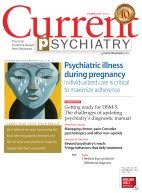Early identification of opioid use disorder (OUD) in pregnant women can be challenging. Self-reports underestimate use and shame, fear of prosecution or involvement of child welfare services, and guilt can further erode self-report. Women with OUD may have irregular menses and might not be aware of their pregnancy until several months after conception. Also, women with OUD who are maintained on opioid agonist therapies may misinterpret early signs of pregnancy—such as fatigue, nausea, vomiting, headaches, and cramps—as withdrawal symptoms and may respond by increasing their opioid dosing, thus exposing their fetus to increased drug levels. Finally, many women with OUD experience amenorrhea as a result of their stressful, unhealthy lifestyle, which may preclude pregnancy despite sexual activity. When these women later enroll in an opioid maintenance program, their endocrine function may return to normal, leading to unexpected pregnancy.
Screening for OUD in pregnant patients has not been well studied. An interviewer’s nonjudgmental, empathic attitude may be more important than the specific questions he or she asks. It may be best to begin with less threatening questions and proceed to more specific questions after developing a therapeutic alliance.


Thank you for your valuable post. We have decided to share it with our global physician audience at PhysicianNexus.com: http://physiciannexus.com/forum/topics/opioid-use-disorder-during
ReplyDeleteJaerou Kim
Team Member
www.PhysicianNexus.com
Physicians Comparing Treatments Worldwide
Hi there, awesome site. I thought the topics you posted on were very interesting.
ReplyDeleteI tried to add your RSS to my feed reader and it a few. take a look at it, hopefully I can add you and follow.
Opiate Addiction